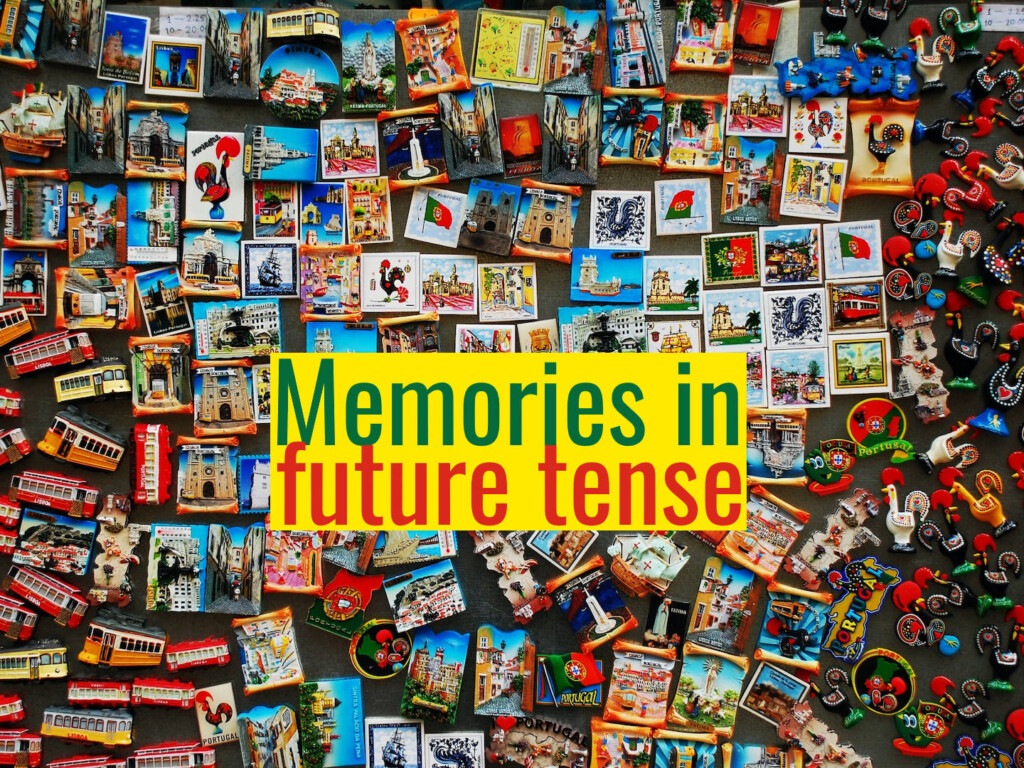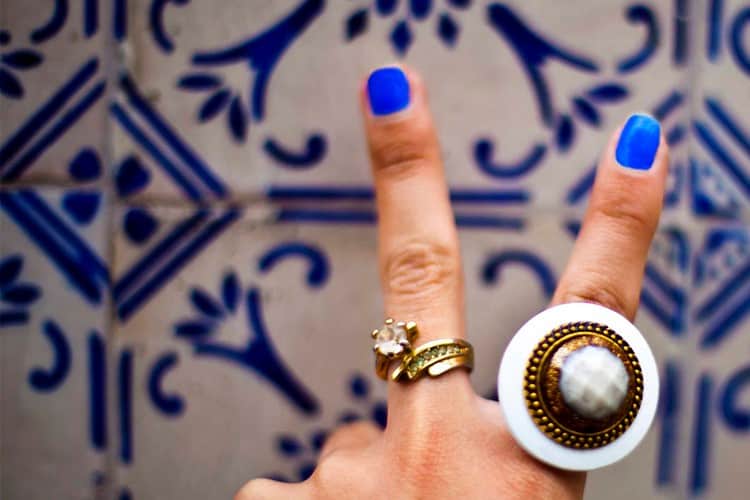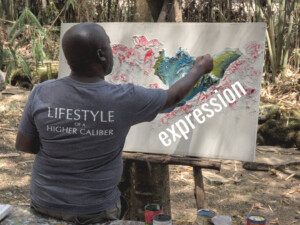Souvenirs: Our sensorial selves, memories of the future

What do souvenirs mean to you?
What do they say about the people who collect them and the places souvenirs purport to represent; then, now, and in the future?
It’s a “Good Tourism” Insight by K Michael Haywood. (You too can write a “GT” Insight.)
Contents
Souvenirs
Having returned from a month in Portugal my head, while writing these words, is still abuzz with the sounds of Fado, the glorious sights of the Douro Valley vineyards, the sensations of Porto, Lisboa, Sintra, Obidos, Nazare, Alcobaca, beach and country life.
But, by the time you read these words, it will be the souvenirs of that trip that help to keep alive my memories of that time; revelatory of the good life, the deepening of relationships, the feelings that come from being-in-the-world.
Souvenirs, the memorabilia that we cannot resist having and collecting, constantly reminding us of how travel changes our lives, sharpens our sensibilities, enriches our perceptions, and banishes ill-conceived preconceptions.
Souvenirs that provide insight into what constitutes value, how it’s manifest and remembered, especially through our senses. Giving rise to emotions and feelings. Playing into our imaginations and our creative pursuits for higher-value achievements.
Throughout our homes, decorative and found objets de art and nature, records, books, clothes, collectables, knick-knacks; each a nostalgic reminisce; a statement; a means of sharing weird and wonderful stories about places we’ve been, people we’ve met.
Also see K Michael Haywood’s “GT” Insight ‘Souvenirs: Can three pieces of coral inspire tourism towards ocean regeneration?’
Souvenirs, reflections of who we are, our interests, what we deem important, beautiful and worthwhile. Touchstones to episodic moments and what we gleaned and learned about the world, ourselves and those dear to us, the cultures of people, the tears of joy, a confluence of everyone’s sensual and lived experiences.
Souvenirs, reminders of the vitality of destinations offering happiness advantages, especially through awe that evokes mindfulness, and the conscientious efforts of everyday people dedicated to creating and embellishing the authentic senses of their place, revealing and revelling in the pride they have for their own communities.
Clearly, souvenirs constitute a study with multiple themes, especially the artisanal movement that honours design and craftsmanship, provides essential livelihoods, and reassures everyone that originality counts if the future viability of communities-as-destinations is to be honoured.
Representative of travel’s transformative gifts, souvenirs serve to arouse awareness, curiosity, and desires, as we transition toward our own desired and not-so-distant futures, serving as “the lens through which our brains continue to view the world and shape our reality”.
Our sensorial selves
As revelatory reminders of the value we crave, souvenirs serve to re-engage our senses that, as time goes by, continue to elevate the novelty of place and the ordinariness or exceptionality of the people we’ve met.
As we recall the sensations that triggered our feelings, whether in nature, at play, or on the road again, it’s as if we are determined to relive what we experienced: Joy and regret, confidence and unease; feelings that augmented or lessened our motivation and trust, and, thereby, our desire to observe, create, learn, and connect.
Free from the constraints of home and work life, our travel-related sensorial experiences intensify, especially when their overtures ascend to exceed the value that is merely functional and transactional; elevated to that which is emotionally, socially, and life-affirmingly transcendent.
Feelings that occur with frequency so long as there is a by design intent that actuates and improves our lives, especially when honoured by those who serve with good sense, sensitivity, and sensibility.
As I write, I nod to the glory of Portugal that re-awakened my senses, simply by multi-sensualising its sense of place; accentuated through engaging tourism design and enhanced through inspiring hospitality that provided “positivity in the present”.
Also see Ricardo Oliveira’s “GT” Insight from Portugal ‘Why We Hate Tourism Tours & why you should too’

Senses that now have developed lives their own, triggered whenever I hear certain sounds, smell certain scents, savour a certain culinary delight, or (in certain situations) am repelled by sights or plights that fright; all of which are well-explained in A Natural History of the Senses.
In reliving and re-constructing my sensual memories, however, I have learned that we have to be circumspect. Our multitude of senses can offer up strange tales, altering the reality of our realities, including the realities experienced and perceived by others, leading to empathetic regard for the well-being and ‘wellth’ of people and place, especially when coming from, what I perceive to be, places of privilege.
In this regard, I now realise how important it is to appreciate how our senses affect and determine how we communicate with ourselves, how the world informs us of itself, and how our future behaviours are likely to be influenced.
While our senses and souvenirs tend to be representative of life understood backwards, they should urge us to fathom and think in the future tense, especially when activated through radical sensory enhancement.
Memories of the future
With the world constantly evolving, however, what happens when we attempt to revive past sensual memories, when our preferred destinations have moved on and are no longer what they were?
It has been 30 years since I initially visited Portugal’s southern regions. Much has changed, but I found my older-self reflecting on what was, amazed with what now is, or, more precisely, struggling to re-interpret a revived sense-of-place that initially, and in a strange sense, seemed out-of-place, yet in a far better or more favourable place.
Could it be I was caught in a time warp, remembering and experiencing the world as it isn’t? My senses reverberating neuro-physiologically, signalling a degree of bewilderment and intrigue in search of renewed awareness, truth, and knowledge based on observation and story-listening.
As happens during absences, I had become unaware as to how others had been actively engaged in dreaming and preparing for a better future, overcoming obstacles and objections in order to bring about change.
Read more by K Michael Haywood
A realisation that the currency of the present is always representative of peoples’ past or former visions; memories of the future whose horizons, at the time, couldn’t help but be deceptively blurry, naïve, and unintentionally vague.
Memories of the future, products of confabulated imaginations that, in the pre-development stage, would be difficult to make sense of unless simulations or prototypes were utilised to facilitate their development, adapt to what could or should be, and identify any unforeseen consequences.
Problems that could be nipped in-the-bud if only more destinations and visitor-serving enterprises first sought to evaluate the purpose of their purpose before formulating a new methodological framework — souvenirs from the future — intended to engage the senses to achieve further creative flow and intelligence.
Souvenirs, in a unique sense, dedicated to driving new behaviours and sensations; facilitating conversations; identifying blind-spots; countering bias and stereotypes; respectful of cultural needs; altering the narratives; and, coherent with purpose-led progress.
I am reminded of the BBC’s 2045: Memories of the Future; wondering why similar efforts aren’t being applied to future-proofing tourism, and carefully contextualised within communities-as-destinations as they strive to enhance their distinct sense of place, their distinct sense of self.
What do you think?
What do you think? What do souvenirs mean to you? What do they say about the places they purport to represent; then, now, and in the future?
Share your own thoughts in a comment below. Or write a deeper “GT” Insight. The “Good Tourism” Blog welcomes diversity of opinion and perspective about travel & tourism, because travel & tourism is everyone’s business.
“GT” is where free thought travels.
About the author
K Michael Haywood is Professor Emeritus, School of Hospitality, Food and Tourism at the University of Guelph in Ontario, Canada. Prof Haywood has recently written an e‑book “Astonish, Smarter Tourism by Design”. Find Michael on LinkedIn.
Featured image (top of post)
Souvenirs from Portugal. Base image by Sunguk Kim (CC0) via Unsplash. “GT” added the words “Memories in future tense”.






